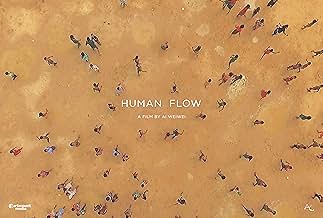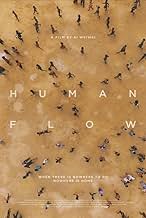VALUTAZIONE IMDb
7,2/10
2873
LA TUA VALUTAZIONE
Aggiungi una trama nella tua linguaHuman Flow is director and artist Ai Weiwei's detailed and heartbreaking exploration into the global refugee crisis.Human Flow is director and artist Ai Weiwei's detailed and heartbreaking exploration into the global refugee crisis.Human Flow is director and artist Ai Weiwei's detailed and heartbreaking exploration into the global refugee crisis.
- Regia
- Sceneggiatura
- Star
- Premi
- 7 vittorie e 14 candidature totali
Recensioni in evidenza
The topic of Human Flow is not something that will give you a good feeling after watching this documentary. Massive human migration caused by wars and persecutions it's something that exists since the dawn of time but with the always increasing overpopulation of our planet it now becomes a real problem as some countries just can't handle such massive numbers of refugees. This documentary is heartbreaking and should be shown to all the right extremists in the world, so that their narrow brain maybe could understand that those people fled their country by necessity, and not to take your job or whatsoever. Most of them if not all of them would prefer staying in their countries if it was not bombed to shreds. The documentary is very well shot, with interesting angles and different stories, mostly sad as the situation is just desperate. I don't see a bright future for the next generation, overpopulation and mass migrations will cause the downfall of mother earth. Director Weiwei Ai did a good job with his documentary but I'm afraid that it won't make much difference. Big up to all the people that try to help others and this daily.
Human Flow is n enormously vital and poetic act of cinematic empathy from Ai Wei Wei, with the equally simple yet wholly complex task of showing us these human beings and that want nothing more than to have a place to call home. Wei-Wei's goal is nothing short of giving to the world - not one singular group or nation, but everyone who should be connected as the human race - a view into what is a crisis across continents and ethnicity and dogma and so on.
Part of the approach is individual human interests with interviews with the displaced - one person in Gaza interviewed in a group of women refugees, for example, has the goal to go on a cruise to see the world and other peoples, but then come back since, somehow, surprisingly, she still likes it their - and part of it is to show the varied ways the displaced happen. If I had any nitpick it's that there's only a small slice of time (in the section on refugees in the Sub-Sahara, and who make up a shocking amount of people that many don't know about) on how climate change will make things even further of a crisis. Perhaps this is only the calm before the storm, and that is terrifying, though Wei-Wei makes this contrasted with how he shoots the film.
His camera-work is not in one set technical approach or style - there are several credited cinematographers, including the Chinese favorite Christopher Doyle - and he'll use cameras on the i-phone or other smartphones, regular giant digital cameras, and cameras attached to drones. This last part gives us these massive, overwhelming takes on human beings; at one point I thought for some reason or another he was about to show us the perspective on an ant colony, but it turns out (of course) to be refugees in a block-style resettlement. He is constantly on the search with his camera for experiences that bring us together, and what I found awe-inspiring is not showing us devastation and despair (though there's certainly some time for that here, people hurt by a bomb and needing to be treated), he shows kindness and how despite everything there's hope and joy. Even these refugees in Syria, who often get looked upon by Americans and some in the West as potential terrorists waiting to spring out if they're let in, like taking pictures of cats and posting them online.
When you have a camera and know how to use it, it can be one of the strongest agents for revealing to us all what connects us together. Politics divides cultures all over the world, as does religion, and divides go back so long that it can be very hard to bring things back together, if ever. Text crawls give us updates periodically in the film about how things are getting more dire, not less, for those who are officially counted as well as those not like in Turkey; what does one do for people who definitely do *not* want to be oppressed by another regime or killed in a war they want no part of, but can't be counted as part of the humanitarian aid? Are they homeless? Hobos? Wei-Wei doesn't sugar-coat a single thing here, and I don't think he can give answers to the audience even if he wanted to.
The sum total of the countries and peoples he shows us, including near the end US/Mexico, is... well, what CAN be done about this, if there's will? This is as important as Herzog's Ballad of a Little Soldier when it comes to documenting a humanitarian crisis. At the same time it's not a dry or boring polemic either; Human Flow is shot and edited to be something that should be seen on as big a screen as possible and with good sound. This is happening now; it's the kind of great art that has a message - for the U.N. more than an average art-house theater.
Part of the approach is individual human interests with interviews with the displaced - one person in Gaza interviewed in a group of women refugees, for example, has the goal to go on a cruise to see the world and other peoples, but then come back since, somehow, surprisingly, she still likes it their - and part of it is to show the varied ways the displaced happen. If I had any nitpick it's that there's only a small slice of time (in the section on refugees in the Sub-Sahara, and who make up a shocking amount of people that many don't know about) on how climate change will make things even further of a crisis. Perhaps this is only the calm before the storm, and that is terrifying, though Wei-Wei makes this contrasted with how he shoots the film.
His camera-work is not in one set technical approach or style - there are several credited cinematographers, including the Chinese favorite Christopher Doyle - and he'll use cameras on the i-phone or other smartphones, regular giant digital cameras, and cameras attached to drones. This last part gives us these massive, overwhelming takes on human beings; at one point I thought for some reason or another he was about to show us the perspective on an ant colony, but it turns out (of course) to be refugees in a block-style resettlement. He is constantly on the search with his camera for experiences that bring us together, and what I found awe-inspiring is not showing us devastation and despair (though there's certainly some time for that here, people hurt by a bomb and needing to be treated), he shows kindness and how despite everything there's hope and joy. Even these refugees in Syria, who often get looked upon by Americans and some in the West as potential terrorists waiting to spring out if they're let in, like taking pictures of cats and posting them online.
When you have a camera and know how to use it, it can be one of the strongest agents for revealing to us all what connects us together. Politics divides cultures all over the world, as does religion, and divides go back so long that it can be very hard to bring things back together, if ever. Text crawls give us updates periodically in the film about how things are getting more dire, not less, for those who are officially counted as well as those not like in Turkey; what does one do for people who definitely do *not* want to be oppressed by another regime or killed in a war they want no part of, but can't be counted as part of the humanitarian aid? Are they homeless? Hobos? Wei-Wei doesn't sugar-coat a single thing here, and I don't think he can give answers to the audience even if he wanted to.
The sum total of the countries and peoples he shows us, including near the end US/Mexico, is... well, what CAN be done about this, if there's will? This is as important as Herzog's Ballad of a Little Soldier when it comes to documenting a humanitarian crisis. At the same time it's not a dry or boring polemic either; Human Flow is shot and edited to be something that should be seen on as big a screen as possible and with good sound. This is happening now; it's the kind of great art that has a message - for the U.N. more than an average art-house theater.
The film is way too long and indulgent of the director's need to insert himself. But the message is far too important to ignore. Watch it anyway.
Eye opening about mass migration populations but it was limited to Africa.
No commentary and no background but lots of shots of Ai Wei Wei looking for a spot in the limelight of other people's sad escapes from poverty, war, starvation and desperation.
If every cent of profit is put back into helping or offering hope, then I might return to this sad tale.
Lo sapevi?
- QuizDirector and Producer Ai WeiWei wanted the film's purpose to pose the question, "Will our global society emerge from fear, isolation, and self-interest and choose a path of openness, freedom, and respect for humanity?"
I più visti
Accedi per valutare e creare un elenco di titoli salvati per ottenere consigli personalizzati
- How long is Human Flow?Powered by Alexa
Dettagli
- Data di uscita
- Paesi di origine
- Siti ufficiali
- Lingua
- Celebre anche come
- İnsan Seli
- Aziende produttrici
- Vedi altri crediti dell’azienda su IMDbPro
Botteghino
- Lordo Stati Uniti e Canada
- 527.845 USD
- Fine settimana di apertura Stati Uniti e Canada
- 45.677 USD
- 15 ott 2017
- Lordo in tutto il mondo
- 1.824.537 USD
- Tempo di esecuzione
- 2h 20min(140 min)
- Colore
- Proporzioni
- 1.85 : 1
Contribuisci a questa pagina
Suggerisci una modifica o aggiungi i contenuti mancanti






















